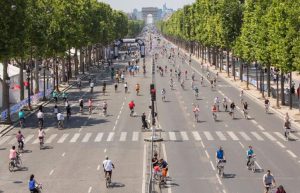 Over the last few years the mayor of Paris, Anne Hidalgo, has been conducting what many have called a war against the automobile. Several major routes running alongside the Seine have been closed off to cars, and are now available only to bicycles and pedestrians. She has called for the elimination of gasoline-powered cars in Paris by 2030. (She has also considered making public transit free.) Today is Paris’s fourth annual day without the car (sorry it’s in French). Throughout the city, all cars are prohibited. (You are allowed to leave your domicile to get out of the city.) Buses are limited to a speed of 18mph. Some of the benefits of this day for Parisians are that it is quieter and the levels of of nitrous oxide are lower. (Some have claimed that it leads to huge traffic jams outside the city.) Mayor Hidalgo’s efforts have caused a certain amount of bitterness in the city. Her claim is that her war is not against the car, but against pollution.
Over the last few years the mayor of Paris, Anne Hidalgo, has been conducting what many have called a war against the automobile. Several major routes running alongside the Seine have been closed off to cars, and are now available only to bicycles and pedestrians. She has called for the elimination of gasoline-powered cars in Paris by 2030. (She has also considered making public transit free.) Today is Paris’s fourth annual day without the car (sorry it’s in French). Throughout the city, all cars are prohibited. (You are allowed to leave your domicile to get out of the city.) Buses are limited to a speed of 18mph. Some of the benefits of this day for Parisians are that it is quieter and the levels of of nitrous oxide are lower. (Some have claimed that it leads to huge traffic jams outside the city.) Mayor Hidalgo’s efforts have caused a certain amount of bitterness in the city. Her claim is that her war is not against the car, but against pollution.
The larger question is: Once a technological system is in place, and a constituency wants to change it, can it be done? How? What is the role of private enterprise, of technical innovation, and the carrots and sticks provided by the government? The City of Raleigh has tried to promote options to the automobile in a far less agressive way than Paris has. It has implemented bike lanes and other features to make the city more bike friendly. What would it take to dramatically lessen our usage of cars in this city? Our city has had the automobile as a basic assumption built into everything done in this city for 75 years. Can the city be remade? Can we be remade?
